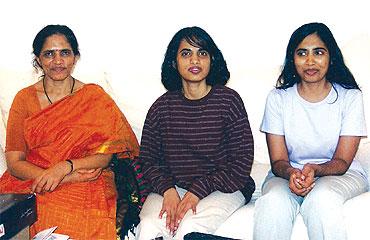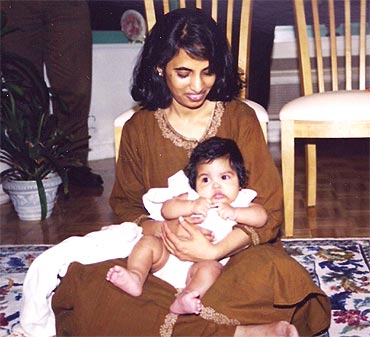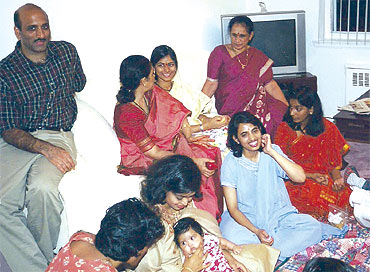 | « Back to article | Print this article |
'I feel like a rudderless ship without Swarna'
It's been 10 years since Swarna Chalasani breathed her last. But even today, the legacy of this 9/11 victim lives on. Students and abused women continue to benefit from her work. Arthur J Pais reports
Long work hours and a demanding job at the Fiduciary Trust International did not deter Swarna Chalasani from following her heart, whether it was rafting in whitewater rapids, counseling victims of domestic abuse at Sakhi (the New York-based women's non-profit organisation) or teaching English at Hunter College.
Swarna was last seen on the 94th floor of the World Trade Center on the day of the 9/11 attack.
Her mother Lakshmi Chalasani, a retired English teacher, still finds solace in these prophetic words on an unsigned greeting card that she found at her daughter's apartment after her death:
I am safe. It's only change.
I cross all bridges with ease and joy.
The old unfolds into wonderful new experiences.
My life gets better all the time.
Lakshmi Chalasani: There are many times I feel I am like a rudderless ship without Swarna to guide me, but then I also remember every word of hers, and everything she did. And with her pictures all around me in the house, I feel she is everywhere.
 |
I remember the saying from the Bhagvad Gita, 'For the soul there is never birth nor death. Nor, having once been, does he ever cease to be. He is unborn, eternal, ever existing, undying and primeval. He is not slain when the body is slain'
A few days after Swarna passed away, I went to her apartment in Jersey City, New Jersey, to collect her things. There I found an unsigned greeting card. We do not know when she bought it, but I feel strongly, it was meant for the family. I have a folder in the house where I keep important documents and the card is now a prized possession. I do not carry it with me all the time, but I have been repeating its words for the last 10 years.
'Swarna has more concern about the homeless than herself'
Chris Farrell, retired police officer: I met Swarna in March 2001. I was working as a sergeant at PATH and a homeless man had fallen on the track, at the World Trade Center. I helped the bleeding man and called an ambulance. Swarna, a stranger then, approached me and demanded to know what happened. She thought I was creating a problem for the homeless person.
The homeless man defended me and cursed her out; I had worked with the homeless for a few years at PATH getting them into shelters and programmes, so the man knew me.
I looked at Swarna again; this slight woman was about 5 feet tall was soaking wet. I am large and strong, but she was more concerned about the homeless than herself. I knew I was in the presence of a true human being or possibly an angel. She was superior in her intellect and her capacity to love people. I think her mistaking me for a violent man may have been one of the few times she was ever wrong in her life.
'I feel honoured to have known her'
On 9/11, 37 Port Authority police officers were killed and our headquarters destroyed. A few days into the rescue, I knew we would never get through without the support of people, and people really came out to help us -- from the Dalai Lama to Bon Jovi.
I promised God that I would take up causes as if they were my own; if we could take care of the families of our fallen. I try to keep my promises. I started putting a dollar a day for some time and watched it grow.
In time I learned about the Swarna Fund at Sakhi to help women victims of domestic violence get back on their feet. The fund helps them with education and internship programmes and it works. I have seen the victims move on. I also learned that for these women 9/11 happens weekly -- 3,000 or more are killed every week by the men they love. I contacted Purvi Shah at Sakhi and spoke at a Swarna Fund event. Every year, I have tried to honour my promise to God and pay back with gratitude the kindness of people. Some years ago, I gave sewing kits to women in Afghanistan as Swarna did.
This year I created an event called Lift a Thon IXXI -- Strongmen for Women. I plan on lifting 100,000 pounds or more in 37 sets one for each cop.
My only question to you and your audience is how will you honour your dead and how will you protect the women of the world and on which side do you stand?
'Swarna had this extraordinary ability to connect with'
Reshma Patel, director, Barclays Capital, and a Sakhi benefit committee member: Many people have not realised that unlike most top recruits at big firms, Swarna did not go to Ivy League schools. She came to America after completing her studies in India. She was about 19, and she went to Baruch College in New York. She paid her college fees herself and worked at McDonalds for sometime.
She was a self-made person in more than one sense. She had to overcome many obstacles and barriers, including that of the language. She also had a lot of moral courage. The story about how she came to befriend a Port Authority police officer is being told again and again. That officer remembers her all the time, especially when he helps Sakhi raise money for its programmes. Swarna had this extraordinary ability to connect with people from all walks of life.
Two years after Swarna's death, her brother Rao wrote, 'Her aspiration to reach for higher things, her desire to be happy in all circumstances, her earnest efforts in reaching out to people, and, above all, her spirit of adventure made her life meaningful.'
'She led a life that was like a prayer'
Lakshmi: Swarna was like an excellent soldier. She was very focused and ready to face any situation. She was very spiritual and considered everything sacred, whether it was an old book or the saris I bought for her.
In Vishakhapatnam, we have an annual award in her memory to help all-rounder students in the schools where she studied. She had a very positive attitude. I tell young people that they should learn that from her. Everyone in the school knows about her; each year, they get to hear the story of her life and her concern for people.
She did not believe in handouts. Her philosophy was that people should be trained to be resourceful. And that was what she was doing at Sakhi, helping women to be courageous and acquire skills that would make them self-sufficient. She was the youngest of my three daughters, but we all looked up to her.
In Hinduism, when we pray, we pray for everyone. And Swarna led a life that was like a prayer. She was always extending a helpful hand to family and strangers.
She enjoyed life and a big part of that came from helping others'
Swarna's love for life, travel and adventure was very endearing. She ran in the New York Marathon, went whitewater rafting in Colorado and backpacked through Thailand. She learnt Japanese and Spanish to prepare for her foreign trips.
Swarna enjoyed life and a big part of that enjoyment came from helping others. I introduced her to Sakhi when she was looking for something to give back to society. She made plenty of time week after week for the organisation, and helped women to learn English and become self-sufficient. Swarna was very focused in working for a cause, but she never spoke about her accomplishments.





